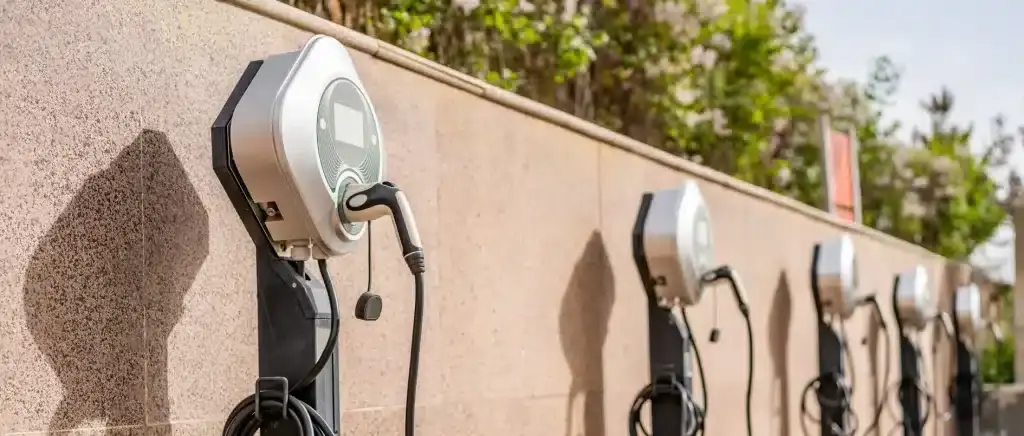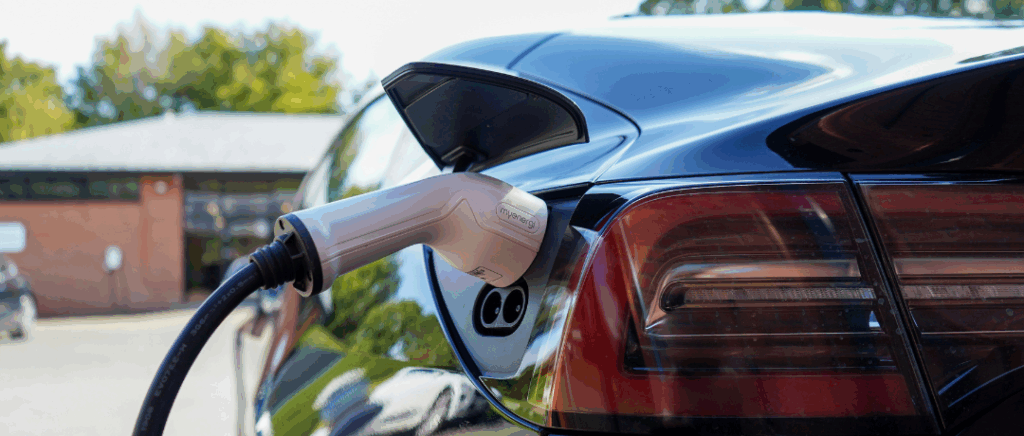What factors influence the cost of a terminal?
recharge?
It's difficult to put a precise price tag on the costs of installing a company charging point. The average budget is between €1,300 and €9,000 for the deployment of a IRVE (Recharging Infrastructure for Electric Vehicles). In reality, a number of factors are likely to have an impact on the costs to be incurred: the specific characteristics of the equipment itself, the constraints linked to the installation and the options chosen. We'll look at each of these in detail.
Charging point characteristics
From the reinforced socket to the totem pole, there is a wide variety of equipment available. Prices can vary from a few hundred to several thousand euros, depending on the following features:
- The power of the charging points: 7.4 kW, 11 kW, 22 kW for normal to accelerated charging points, or from 22 kW to over 120 kW for rapid charging points. A proper assessment of the power required will enable you to budget for your project as accurately as possible, bearing in mind that there are more significant price differences between standard and fast-charging equipment. alternating current (AC) and direct current (DC). There is no significant difference in price between the 7.4 kW, 11 kW and 22 kW terminals.
- The number of charging connectors per terminal (one or two charging points).
- Equipment features: remote communication, connected terminal or 'intelligent', etc.
Good to know: you should also pay attention to certifications guaranteeing the compatibility of recharging equipment with electric vehicles, such as the Z.E. Ready and E.V. Ready which cover both infrastructure and compliance with installation standards.
Price ideas based on charging point models
- Terminal with one charge point
- Power: 3.7 to 22 kW
- Socket: type 2
- From €600 excluding VAT (excluding installation) for a non-connected plug and charge terminal and around €900 excluding VAT (excluding installation) for a connected terminal.
For what uses?
One or two electric vehicles (utility vehicle, company car). Light to moderate rotation. Full charge of the vehicle during the day or night.
- Terminal with 2 charge points
- Power: 22 kW
- Connected
- Expect to pay between €3,300 and €4,000 excluding VAT (excluding installation), depending on the brand.
For what uses?
Greater vehicle rotation. Two vehicles can be connected simultaneously. Full charge during the day, between journeys.
- Totem-type fast or ultra-fast recharging stations
- Power: 22 kW, 30 kW, 60 kW, 120 kW, 180 kW
- With RFID card access control and one or two charge points
- Between €6,000 excluding VAT and €70,000 excluding VAT (excluding installation)
The most powerful equipment, corresponding more to public charging points, is oversized in relation to the needs of small and medium-sized businesses.
Of course, costs also depend on the number of charging points to be installed. That's why it's essential to estimate your project as accurately as possible beforehand, as we'll see below.
The cost of installation
There is no fixed price for installing an electric vehicle charging infrastructure. The cost of labour depends on a number of technical factors.
The existing electrical installation
In some cases, work to bring your home up to standard is necessary. This is likely to involve additional costs, but is imperative in order to guarantee the safety of your employees. You should also check the type of electrical system used or "neutral system":
- TT (earthed on the transformer and user sides),
- IT (isolated from earth on the transformer side and earthed on the user side) or
- TN (earthed on the transformer side and neutral on the user side).
For example, the IT neutral system may require the addition of an isolation transformer when recharging certain vehicles.
The configuration of the installation site
A long distance between the bollard and the electricity meter can lead to civil engineering worksand the installation of a longer, and therefore more expensive, recharging cable. In an indoor car park, the bollard will generally be fixed to the wall. Outdoors, standing bollards are preferred, which means additional civil engineering work.
The number of charge points
Installing a single IRVE does not, of course, have the same financial impact as deploying a dozen or so chargepoints. On the other hand, the more chargepoints you install, the cheaper the work will be. For example, if you install a double chargepoint, installing a second chargepoint of the same type allows you to pool the cost of the work, with a possible reduction in costs of around 20 to 40 %.
Good to know: The installation of a recharging point must be carried out by a technician who is qualified to do so. IRVE qualification. This certification proves that the electrician is qualified to install an electric vehicle charging point in compliance with safety standards.
Optional contracts: supervision and maintenance
In addition to the costs of equipment and installation, there are also the costs of supervision and maintenance of the charging points in the initial budget. Although these options are optional, they can greatly facilitate the management of your equipment and extend its lifespan.
The price of a maintenance contract can be calculated according to the number of bollards or the site. The cost is between €250 and €600 excluding VAT per year and per bollard. It includes the intervention of an approved electrician on site in the event of a fault or malfunction, as well as an annual maintenance visit.
Le supervision service (also known as the billing tool) allows you to manage your charging points from an online platform. This can be used to retrieve consumption data, implement RFID badges to secure the chargepoints or restrict access to company users only. The cost of the supervision service is determined for each chargepoint. It varies according to the needs defined upstream: reimbursement of recharges made by employees, assistance service or dedicated hotline, etc. The cost of a billing tool is between €5 and €10 per month, per chargepoint.
The maintenance contract is invoiced on an annual basis, while the supervision service can be paid for on a monthly or annual basis.
| Type de borne | Type de courant | Coût moyen d'installation | Temps d'installation | Coût de maintenance annuel |
|---|---|---|---|---|
|
7 kW AC terminal
|
Alternating current
|
1 200 € - 2 500 €
|
1 - 2 days
|
100 € - 200 €
|
|
22 kW AC terminal
|
Alternating current
|
2 500 € - 5 000 €
|
1 - 2 days
|
150 € - 300 €
|
|
DC 50 kW terminal
|
Direct current
|
20 000 € - 40 000 €
|
2 - 5 days
|
500 € - 1 000 €
|
|
DC 150 kW terminal
|
Direct current
|
50 000 € - 100 000 €
|
3 - 7 days
|
1 000 € - 2 000 €
|
|
Bidirectional Bollard 11 kW
|
Alternating current
|
5 000 € - 10 000 €
|
2 - 4 days
|
200 € - 500 €
|
|
22 kW two-way bollard
|
Alternating current
|
10 000 € - 20 000 €
|
2 - 4 days
|
300 € - 600 €
|
|
350 kW Ultra-Rapid Bollard
|
Direct current
|
100 000 € - 150 000 €
|
5 - 10 days
|
2 000 € - 5 000 €
|
Preparing for your project to install kiosks in your company
Installing recharging points in your company is a project that requires a minimum of preparation. You need to choose the right equipment to fully meet your employees' expectations, while also taking into account your budgetary constraints.
The first step to successfully deploying charging stations is to ask yourself the right questions:
About your employees' needs:
- Are my employees nomadic or sedentary? This question will help you determine whether a full recharge is feasible during office hours or whether, on the other hand, regular travel requires a quick recharge between trips.
- How much time do you allow for business travel (deliveries, customer meetings, sales prospecting)?
- How many electric vehicles (vans or company cars) do I have in my fleet?
Technical specifications:
- What is the contract power? How much power do I have?
- Where will my bollards be installed (in an outdoor or underground car park, in a garage, etc.)? This question is important in order to anticipate any additional installation costs associated with a location far from the electrical panel.
Answering these questions will enable you to define more concretely the type of equipment you need, both in terms of power and functionality.
Charging stations: what return on investment?
Companies wishing to do so can amortise the cost of installing one or more terminals. In particular, it is possible to charge for top-ups by certain groups of users to make the equipment more profitable.
Different billing models can be set up depending on your short-term or long-term objectives.
- La flat-rate billing The charging system: easy to deploy, since it is uncorrelated with notions of time or energy actually consumed, it does not automatically distinguish between groups of users (visitors, employees and customers, for example). The charges levied are not always fair, and users are not encouraged to leave the charging point immediately once they have recharged.
- La time-based billing It makes access to the charging points more fluid, as users do not exceed the time allocated for recharging to avoid being overcharged. On the other hand, certain categories of users (slow rechargers) are penalised.
- La kWh billing Time-based billing: this billing method is similar to that used for petrol pumps, in that the user only pays for the energy consumed. It requires a billing tool to be put in place to assess the cost of consumption (this is also the case for time-based billing).
Le charging station supervision system offered by Beev is the ideal solution for automatically invoicing users, establishing user profiles, monitoring consumption, finding out remotely about the availability of a charging point and benefiting from optimum visibility of applications for finding recharging points. All this information is centralised and accessible via a intuitive dashboard.
How much does it cost to hire charging stations?
Is there a way to develop eco-mobility within your company on a limited budget? The answer is "yes", thanks to the hire of recharging points. This service makes it possible to install an IRVE without incurring substantial costs, by paying a fixed fee. monthly rent for the duration of the contract (between 3 and 5 years).
Under a LOA (Location avec Option d'Achat) contract, the company has the option of purchasing the terminal at the end of the contract, or even benefiting from more recent equipment. If they do not wish to purchase the equipment, the operator will take care of de-installing it and recovering it at the end of the contract. It's a highly flexible service.
Would you like to find out more about Beev's charging point rental offers?
Here is an example of a calculation made using our simulation tool, for an equipment project estimated at €5,000 excluding VAT. The commitment period is 5 years, i.e. 60 months, with an initial rental payment of €1,312.50. You will receive monthly payments of €20.59. This price is calculated on the basis of a flat rate that is independent of energy consumption.
Depending on the package, you can take advantage of the following services supervisionwhich may or may not be included in the monthly payments.
With BeevWith this new concept, hiring a high-quality charging point is accessible, simple and cost-effective. Calculate your rent now or request your no-obligation quote.
Find out about your financial aid with our simulator!
Need to find out about financial assistance for your recharging solution? Use our project simulator to find out about your subsidies to reduce the costs of buying and installing charging stations.
Financial assistance
While the French government has introduced a number of schemes to support sustainable mobility for businesses in response to ecological and economic challenges, the grants and subsidies available to professionals are subject to regular change.
Launched in 2016 for a limited period (until 30 June 2020) the ADVENIR programme has been extended until the end of 2025. The scheme, which aims to defray some of the costs incurred by businesses in installing charging points, is distinguished by strict award conditions. From January 2023, the following provisions will apply:
- The programme Charging point open to the public in a private car park is maintained, with a subsidy increased to 30 % of the cost of the project, capped at €1,000 excluding VAT for AC (alternating current) terminals and €2,700 excluding VAT for a terminal. DC (direct current).
- The initial programme dedicated to private car parks not accessible to the public (fleets and employees) has been discontinued. The Charging point for fleets and employees of automotive service professionals is offering a specific subsidy for car service professionals. This aid can be seen as a "catch-up", since the initial grant does not include this category. The amount of aid allocated is 25 % of the total cost of the project, capped at €750 excluding VAT per recharging point.
Don't hesitate to ask your local council for more information, as some regions have introduced subsidies for companies wishing to purchase and install recharging stations. This is particularly true of :
- Programme to support the installation of charging points for businesses in the Grand Est region,
Normandy region's "Sustainable Mobility" programme, - The Occitanie region's "Flexitanie" programme.
Every charging infrastructure installation project is unique. That's why our team is there to support you, from estimating your budget to choosing your equipment, then deploying it and beyond!
If you would like to find out more aboutsupport for the installation of charging points for businesses in 2024For more information, see our article on this subject.
































